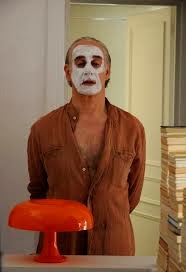Everything shines...
The parties, endless,
the freaks,
the frivolous quotations,
the boredom,
the appalling actress writing a book,
the actor loving Proust,
the lunatic, the poet, the exorcist papal official that only talks cooking books,
the old tv soubrette, the provincial,
the conceptual artist without a concept,
the noble people without wealth,
the nuns,
the ladies, ...
the freaks,
the frivolous quotations,
the boredom,
the appalling actress writing a book,
the actor loving Proust,
the lunatic, the poet, the exorcist papal official that only talks cooking books,
the old tv soubrette, the provincial,
the conceptual artist without a concept,
the noble people without wealth,
the nuns,
the ladies, ...
«O Roma, o morte!», they used to say.
But here everyone is already dead, starting with the japanese tourist that initiates the film.
But here everyone is already dead, starting with the japanese tourist that initiates the film.
They all try their best in order to appear alive, they dance, they talk,
but in fact they all know they have “ a devastated life”.
but in fact they all know they have “ a devastated life”.
That nothingness
to which Flaubert would have liked to dedicate a novel (no subject or context,
just style) and to which the ex writer Jep Gambardella has dedicated all his
life, becoming “the king of mundains”.
Jep has reached a point in his life when he’s beginning to mourn lost
love and missed opportunities. He is a dapper, cultured and dilettantish Roman,
always dressed in a fine suit and fine shoes.
As the film opens, he celebrates
his sixty-fifth birthday with a hedonistic party in his flashy apartment which
overlooks the Coliseum on one side and a convent on the other.
In his world,
the high life meets the low life, writers and thinkers mingle with strippers
and models.
He is a virtuoso of the void.
But he is also the only one knowing for sure that the roman “dolce vita” isn’t
even bitter or nostalgical or decadent.
It is just pure vacuity.
Sorrentino and Bigazzi’s camera seems to be restless.
It jumps in circles,
it travels forward, it flies and it captures in its solid squares the
characters.
It never tries to arrive anywhere or to multiply. But to keep
company, to illuminate the density of a scene...
...and then slides abruptly towards something else: the flat sea,
a silent garden, a statue, a piece of sky.
Why does Jep-Toni Servillo want so much to touch the Great Beauty?
As an epiphany
that remained unatteined? That he is unable to record?
So many
actors, so many special appearances, so many episodes, so many quotations, Fellini but also Scola, sunsets, sunrises and
flamingos.
The “so much” and the “too much” are altogether the instrument and the
meaning.
The
far-too-beautiful rubs up against the overly grotesque.
Quick wit and clever
conversation are never far away.
From this nothingness and lack
of meaning Jep creates an alibi for his own nullity.
What could take him back,
to the initial summits of his life hopes?
A new flash of love for Ramona (a
mature sensual woman)?
The quasi real friendship for Romano, as much of a writer
as he is?
The decrepit, hyeratique and mute appearance of a “saint” that comes from
Africa and looks like Mother Teresa of Calcutta?
There is no Beauty in the
splendid Rome of Sorrentino.
Its masters are vulgarity and cynicism, as well as
Jeps’.
Who waits for Death as if it meant returning home to the Great Beauty of
a sweet and intense love of his twenties…
But over the luminous images of
that great beauty, emerges the decline of the African saint.
Her body and her face are
tensed in the effort to climb some stairs that should grant her escape from
the flames of the Inferno…
And to us it looks like the
spasm of Death iself…
A moral languor
to bring over vertigo.
And in the background, Roma,
in summertime.
in summertime.
Beautifull
and indifferent.
Like an expired diva.
And yet...
“the journey that we’ve been given
...is all imaginary”....
“the journey that we’ve been given
...is all imaginary”....
“La
grande bellezza”, by Paolo Sorrentino (Italy and France, 2013, 142’)


















No comments:
Post a Comment